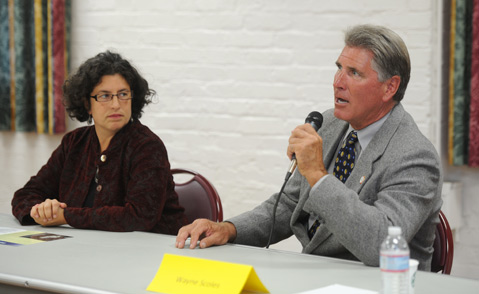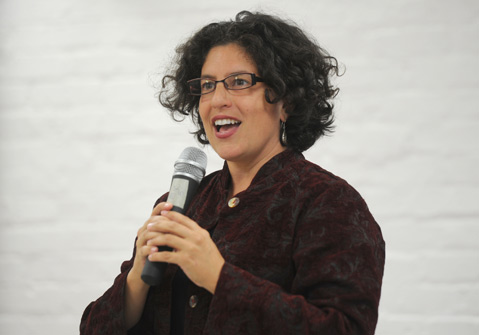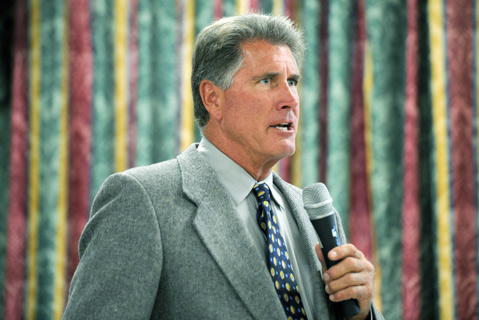The Mayor Just Wants to Have Fun
'Swamp Rat' Turned Mesa Rat Challengers Schneider

Santa Barbara’s Mayor Helene Schneider must be doing something right. Either that or she’s been extremely lucky. Probably both. Unless Schneider, a wonky moderate progressive, gets hit by an errant lightning bolt during the next 25 days, the experts and prognosticators predict she will be reelected to the council’s top spot by more than a comfortably vast margin. Her opponent, Wayne Scoles, a fiercely outspoken political Everyman from the Mesa, has made himself a fixture at City Council meetings over the past seven years, routinely excoriating the police for failure to enforce existing city laws having to do with speeding drivers, homeless vagrants, and gangbangers.
To date, Schneider has raised nearly $100,000 — an outlandishly large amount by Santa Barbara standards — and has chalked up endorsements from just about every political organization with more than two members. At a time when most candidates are gritting their teeth for the final stretch, Schneider is not just relaxed but affirmatively having fun. At a recent cabaret, for example, the mayor showed up dressed in a cheerleader’s outfit, a cowboy hat, cowboy boots, and pom-poms and convincingly belted out a couple of songs. A drama geek back from her high school days, Schneider can still carry a tune. One of the musicians backing her up noted approvingly, “Our mayor’s a nut.”
By contrast, Scoles, a plumber and a pipefitter by trade, is waging a valiant, if lonely, effort. To date, he has reported raising only $600 and loaning his campaign another $2,000. He shows up at forums and has dusted the Mesa with an impressive number of yard signs. “It’s just me,” he said. Scoles doesn’t knock on doors or call people at home, explaining, “I see that as an invasion of privacy.” But Scoles, a large and physically robust 60-year-old, is anything but daunted. The so-called experts, he noted, are routinely proved wrong. “I wouldn’t be running if I didn’t think I could win,” he declared. Scoles may be tilting at windmills, but he can legitimately claim to have taken on City Hall before — involving a high-profile showdown with Police Chief Cam Sanchez — and decisively won. “Grassroots operations can still succeed,” he said. “It isn’t always a matter of who has the most money.”

Schneider’s No-Issues Campaign
Compared to previous council races, this year’s is devoid of any obvious line-in-the-sand issues by which voters can easily define the candidates. Santa Barbara’s liberal establishment, as has often been the case, could not agree on which candidates to back; as a result, four liberal Democrats — one of whom is an incumbent — find themselves chasing after three open seats. And the other side is only slightly less disjointed. When Schneider first ran for mayor four years ago, the picture was dramatically different. At that time, she was a sitting councilmember representing the left side of the aisle and found herself running against fellow councilmembers Iya Falcone and Dale Francisco — both formidable figures — and Steve Cushman, then the head of the Chamber of Commerce. Throw into the mix an initiative that would lower the city’s maximum building-height limit and Texas billionaire — and former Santa Barbara resident — Randall Van Wolfswinkel, who spent a record-shattering $750,000 trying to effectuate a right-wing makeover and takeover of City Hall. Despite the onslaught, Schneider managed to win, but Van Wolfswinkel got two conservatives elected, thus pushing the council needle decidedly to the right.
Schneider’s first two years as mayor were decidedly bumpy. City finances took a major hit thanks to the worldwide recession. With ideological pugilists like Das Williams and Michael Self on the council, meetings devolved into paralysis by polarization. Two years in, Williams would be elected to Sacramento and Self would be defeated by Cathy Murillo. Since then, Schneider has come into her own, and the council has become a decidedly less rancorous place. A watered-down version of a new general plan — the battleground where hot-button issues like increased residential densities got hammered out — was unanimously passed. The council unanimously put Cliff Drive on a “road diet” — always a contentious matter among dueling transportation advocates — meaning Cliff was re-striped to create new bike lanes by reducing one lane of traffic. And last week, the council voted to approve a plastic-bag ban — admittedly after seven years of bureaucratic trench warfare — with no dissenting votes.
All sides are quick to credit Schneider’s leadership for this turnaround in tone. Schneider — who has hewed a more centrist course as mayor than as councilmember — has made an effort to reach out to groups that previously “weren’t in my Rolodex,” like the Milpas Community Association. Eight years ago, Schneider said, the group’s anti-homeless rhetoric and tactics would have elicited an “us/them” response. Today, that’s changed. “There’s no such thing as ‘us/them’ when it comes to such a complex problem,” she said. As mayor, Schneider said she’s shied away from enmeshing the council in extraneous wedge issues. “If I can support gay marriage as the mayor — which I have — do I really need to bring a resolution to the council?” she asked, “knowing the bad blood could have repercussions on issues more directly related to city policy?” By the same logic, Schneider conspicuously did not endorse any of the candidates running for City Council two years ago, not even the slate of three endorsed by the Democratic Party who would have unseated three conservative incumbents. This abstinence hurt Schneider’s relationships with some Democratic leaders, notably Daraka Larimore-Hall, with whom Schneider’s longtime political consultant Jeremy Lindaman has so famously feuded.
If Schneider takes pains to get along, she doesn’t always go along. About a year ago, she unveiled a complex package of three ballot initiatives that would have raised or saved City Hall $12 million a year without first checking in with any of the usual — or affected — stakeholders. For this, Schneider was roundly blistered and ultimately forced to beat a strategic retreat. In hindsight, Schnieder insists she accomplished her objective — to spark community discussion on issues like pension reform and the need for new income streams — and takes comfort in the adage, “You never hit a home run if you don’t go up to bat.” Likewise, Schneider took considerable heat for City Hall’s decision to initiate a gang injunction without first holding any public meetings. Schneider is more vexed that the injunction has been held up in court for nearly three years and that it’s been the subject of so much confusion and what she terms “misinformation and disinformation.” She said she took pains to meet first with people she knew would be critical to better take their concerns into consideration.
“Fool me once, shame on you,” Schneider has repeatedly said. “Fool me twice, shame on me.”
For the past year, Schneider has been waging a full-body-contact showdown with Caltrans and the Santa Barbara County Association of Governments (SBCAG) over the latest installment of the freeway-widening project, slated to cost $500 million and take 15 years to build. Unless the railroad undercrossing by the Andrée Clark Bird Refuge is widened to accommodate more cars, bicycles, and pedestrians, Schneider has threatened to withhold approval of the necessary city permits for the project to move forward. She has rebuffed entreaties from Caltrans and SBCAG to trust that the work will get done and the funding eventually provided, citing their failure to deliver on the exact same promise made in connection with a previous freeway project in 1996. “Fool me once, shame on you,” Schneider has repeatedly said. “Fool me twice, shame on me.”
Naturally, it’s not quite that simple. Schneider’s campaign manager, Lindaman, represents a group of Montecitans — Commonsense 101 — who are demanding that the left-hand exit lanes onto Cabrillo Boulevard be retained despite Caltrans’s vehement insistence such ramps are inherently unsafe. This group has the money and the juice to have arranged a meeting with the director of Caltrans, the head of the Department of Transportation, and a representative from Governor Jerry Brown this summer. Schneider went along and repeated her threat to withhold the necessary permits. In so doing, she helped crowbar concessions on behalf of Commonsense 101: further meetings to explore whether the Cabrillo offramps are as dangerous as Caltrans claims.
Activists with Commonsense 101 have been especially upset with Gregg Hart, the public information officer for SBCAG, whom they consider both an impediment and a stooge for Caltrans. Hart happens to be running for the City Council and is part of the slate endorsed by the Democratic Party. Schneider has been outspoken in expressing her concerns that if elected, Hart would have a serious conflict of interest. City Attorney Steve Wiley says otherwise, but Schneider has argued that the state’s fair Political Practices Commission will have to weigh in. (Hart has declined to recuse himself on the matter unless so ordered, arguing his knowledge would be beneficial. He has cautioned that delays to the project will drive up construction costs, eating into limited funds that might be available to address City Hall’s concerns.)
In the meantime, Schneider strongly encouraged former councilmember David Landecker to postpone his announced retirement from local politics earlier this year and enter the race for council. Much to the consternation of the Democratic Party — which declined to endorse Landecker — he did so. In the calculus of campaign consultants, this year’s two incumbents — Bendy White and Frank Hotchkiss — are likely to be reelected, leaving the third spot a toss-up between Hart and Landecker, both liberal Democrats. Schneider rebuffed the suggestion she was trying to take Hart out. “I don’t see my support for David as anti-Gregg,” she insisted. “It’s pro-David.”
Many political observers — some associated with Hart’s campaign — have been quick to suggest Schneider is attempting to curry favor with wealthy Montecito donors for when she runs for 1st District Supervisor, a seat now occupied by Salud Carbajal. Carbajal has all but announced he plans to run for Congress the moment Democratic Congressmember Lois Capps indicates she’s done, and in political circles, it’s a given that Schneider will seek his post. If so, it’s worth noting that the city’s Planning Commission unanimously expressed similar concerns as Schneider’s with Caltrans’s freeway-widening plans. And at a recent forum, all but one council candidate — Hart — expressed reservations, as well. As for her plans for higher office, Schneider said, “Last time I checked, that seat was occupied,” adding with a smile, “Right now I’m just running for a second term as mayor.”

Scoles’s Shoreline Speedway
By contrast, Wayne Scoles’s campaign is simplicity itself. “I’m sick and tired of the police not enforcing the laws,” he said. It started, he said, with drivers speeding along the Mesa’s Shoreline Drive, where Scoles lives and can be seen walking his dog. Scoles cited an elderly neighbor who fought in the Philippines during World War II but who is afraid to cross Shoreline Drive. “He’s never felt more afraid than when trying to cross the street,” said Scoles. City traffic engineers installed a sign declaring pedestrians have the right-of-way, and that, Scoles said, helped. But motorists repeatedly crashed into the sign, he said. After the third replacement, he contended, City Hall gave up, and pedestrians — once again — are left to fend for themselves.
Scoles moved to Santa Barbara 39 years ago upon the advice of an ex-girlfriend who told him he’d like it here. A young man just out of the military — Scoles was on his way to Vietnam when the plane was ordered back — he studied studio art at UCSB and later got a degree teaching. He grew up on Fort Bragg in North Carolina, where his father served. As a young kid, Scoles — a self-described “swamp rat” — remembers being batboy on his father’s baseball team, with the Ku Klux Klan surrounding the field. The Klan objected to the presence of black players. “These were guys who served in two wars,” he said of the African Americans at Ft. Bragg, “but off the base they were fourth-class citizens.” Ultimately, troops were ordered to surround the Klan members with their rifles drawn, and the game eventually went on. The moral of the story — like most Scoles tells — is always the same: “You have to stand up for your rights. Don’t let people push you around.” What makes America special, Scoles said, is that people can stand up and make a difference. But that doesn’t make it easy.
Scoles is well known at City Hall, where he regularly delivers passionate critiques of the city police during the public comment period at the beginning of council meetings. Often, his face gets red, and his voice gets loud. Scoles is a big muscular guy, and he looks like he might explode. But — as he noted — he never has. He likened his style to “a hammer driving the nail home.” As a former teacher, Scoles said he has to get the council’s attention before they can absorb his message.
“Sometimes you have to do it like a TV minister and take them up to a crescendo and then release,” he explained. If at City Hall Scoles is regarded as a crank, on the Mesa, he’s been an unmistakable presence, helping older residents with home repairs and groceries, serving as a one-man neighborhood watch. And on occasion, Scoles has been known to confront people he thought were up to no good. On August 27, 2008, Scoles said he was passing out fresh fruit to elderly residents at Shoreline Park. Police Chief Cam Sanchez was attending a relative’s wedding there. Scoles had made his opinions known to the chief well before, but when Sanchez walked by, Scoles asked some pointed questions about the stretch limo associated with the wedding party that was taking up lane space on the road.
Scoles said he then asked some pointed questions about the lack of police services to complaints about “illegal immigrants and gangbangers.” Acording to Scoles, Sanchez started wagging his finger at him, and Scoles retaliated in kind. According to Sanchez, Scoles made derogatory remarks about Mexicans and threatened to beat him up. Sanchez had Scoles arrested. Scoles denied the charges, and the case went to trial. Had he copped a plea, Scoles said, he would have been denied the security clearance needed to work many of the high-tech Defense Department jobs that he’d had. The jury deliberated about three hours before it acquitted Scoles. He later filed a federal civil-rights case against the city, but that case was tossed by a federal judge. Scoles remains convinced a cover-up was involved.
Later, Scoles would attempt to read the contents of the city’s internal investigation of his case. But when he showed up unannounced at City Attorney Steve Wiley’s office, Wiley kicked him out and threatened to have him arrested. “He was waving his arms and raising his voice and getting loud,” Wiley said. “He was scaring people, so I kicked him out.”
“I don’t have a problem with immigrants,” he said. “I have a problem with illegal immigrants.” He added, “I dislike people of all races equally. It’s who the person is that matters.”
Scoles especially bristled at the suggestion he is bigoted. “I don’t have a problem with immigrants,” he said. “I have a problem with illegal immigrants.” He added, “I dislike people of all races equally. It’s who the person is that matters.” Scoles said he supports the creation of a police oversight committee, adding that when citizens file complaints against the department, they should be able to review what evidence the investigators dig up. Scoles also supports the creation of a citizens’ phone line, allowing members of the public to weigh in on City Hall deliberations. “That way, the public will tell if the council is voting with the people or against them,” he explained. Scoles has also suggested that frontline workers at City Hall be given a financial reward for suggestions they make saving the city $10,000 or more. On more traditional matters, Scoles said he opposes any increase in housing density. “To think it will somehow help get people out of their cars,” he said, “doesn’t make any sense. It will just make the problem worse.”
The Wayne Scoles who shows up at campaign forums is a far cry from the hell-raiser who shows up at council meetings. He was visibly impressed that 140 high school students showed up to the youth forum held this Monday night, repeatedly telling those in attendance, “You are the leaders of the future.” Scoles exhorted them to stand up for themselves and “be who you are.” And as someone who had always hoped to ply his pipefitting skills in outer space, Scoles assured them, “Every single one of you will have the opportunity to go into space.”
Scoles acknowledged that he may be a long shot, but he said nobody ever expected he’d beat the chief of police in court either. “It’s not like I wanted this job my whole life,” he said. “And if I won, it would be a serious drop in pay.”



